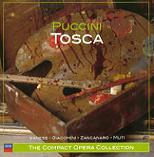Were I experiencing this performance while sitting at the back of a large opera house, I would be tickled pink at the energy (and volume) level of this excellently played albeit generic Tosca. Riccardo Muti and his Phildelphians wring the devil out of this score, with brass blazing and momentum relentless; indeed you might complain that Muti drives even the love music a bit too hard, but subtlety in Tosca is a luxury, and a rare one at that. Carol Vaness is a good Tosca in absolutely secure voice, and she even manages some hateful chest-register explosions in the long Act 2 confrontation with Scarpia. She offers no new insights but she sings beautifully, with big tone, filled with diva-like moments.
The same might be said for the under-recorded Giuseppe Giacomini, a big-voiced tenor who can be very exciting. Just when we have a tenor who might be able to hold high notes forever, we get the rigid taskmaster Muti who allows no such thing; nonetheless, here is full-bodied singing to be appreciated. Giorgio Zancanaro’s bright, perfectly Italianate baritone is a joy as Scarpia, and while he also is threatening only in an all-purpose way, what a pleasure it is to hear the role sung so well. He’s languid at the start of the Te Deum in a nice, oily manner.
However, repeated listenings reveal the ordinariness in this reading and genuinely make you believe that in fact this is the “shabby little shocker” it’s been said to be. We’ve learned that we can be moved by Tosca and Cavaradossi and genuinely horrified by Scarpia (Callas, maybe Carreras, Gigli or di Stefano, Gobbi), and so this set must take a far back seat to many other performances despite some splendid singing and playing. Opera is theatre, after all, and this set is just big, well-performed music.
































